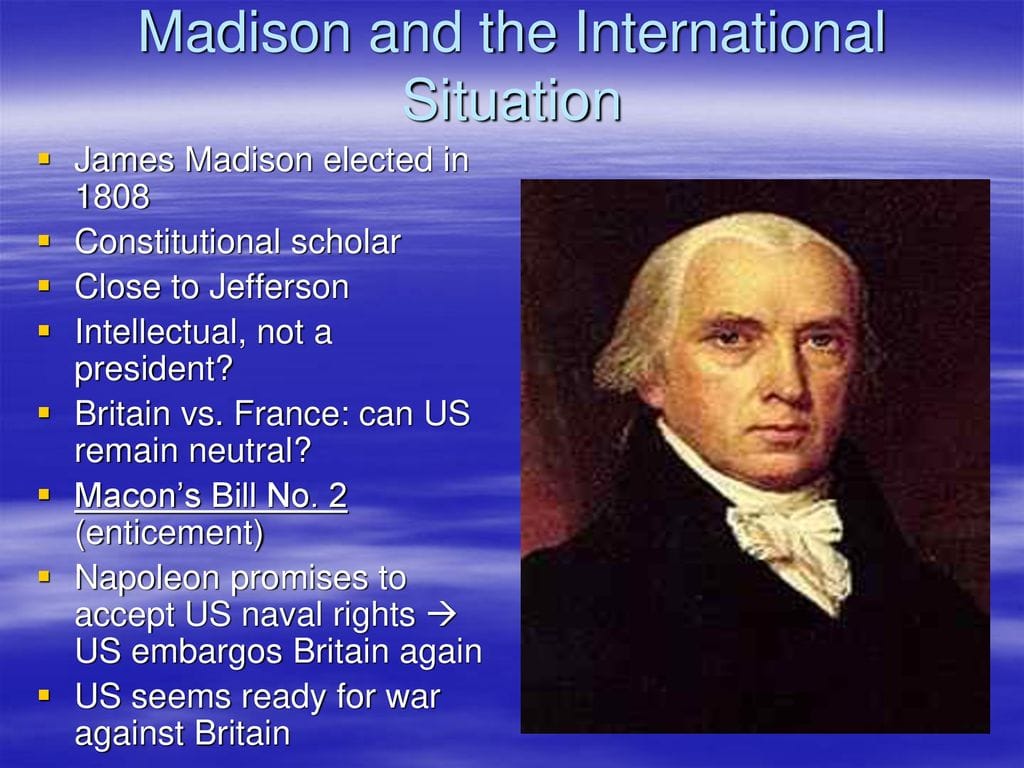A Desperate Gambit for Peace?
Picture this: It’s 1810, and the United States, a young nation still finding its footing, is caught in a geopolitical tug-of-war. Across the Atlantic, Europe is ablaze with the Napoleonic Wars, and both France and Great Britain are routinely violating American neutrality on the high seas. Enter Macon’s Bill No. 2, a desperate attempt by the U.S. to safeguard its interests and avoid being dragged into the conflict.
This bill, named after Congressman Nathaniel Macon (although he ultimately opposed it), was America’s gamble to leverage its economic power for peace. It reopened trade with all nations, offering an enticing proposition: if either Britain or France ceased their interference with American shipping, the U.S. would impose sanctions on the other. It was a high-stakes game of economic coercion, designed to force these European powers to recognize American neutrality.
Napoleon’s Ploy and a President’s Dilemma
Napoleon Bonaparte, the shrewd French emperor, saw an opportunity in Macon’s Bill No. 2. He quickly promised to respect American neutrality – music to the ears of President James Madison, who was desperate to avoid war. However, historians suggest that Napoleon likely never intended to keep his word. Was this a calculated maneuver to drive a wedge between the U.S. and Great Britain, further entangling them in Europe’s wars?
Madison, perhaps placing too much faith in Napoleon’s promise, reimposed the embargo on British goods. This decision backfired spectacularly. Britain, already fuming about American neutrality, felt betrayed by this apparent siding with France. Tensions between the two nations skyrocketed, fueled by the seizure of American sailors and ships, escalating the conflict toward an almost inevitable boiling point.
Adding fuel to the fire was a group of pro-war congressmen known as the “War Hawks.” They viewed conflict with Great Britain as a chance to assert America’s position on the world stage and protect its economic interests. By June of 1812, diplomacy had completely collapsed. The United States declared war on Great Britain, marking the beginning of the War of 1812, a conflict significantly influenced by the failures of Macon’s Bill No. 2.
The Legacy of a Failed Gamble
Macon’s Bill No. 2 serves as a potent reminder that even the best-laid plans for peace can have unintended consequences, especially when powerful nations are engaged in a high-stakes struggle for dominance. The bill’s failure highlighted the limitations of economic pressure as a tool of foreign policy and underscored the need for a strong military to protect a nation’s interests. Some historians even propose that Macon’s Bill No. 2 indirectly influenced the Monroe Doctrine, a later declaration that essentially warned Europe against further interference in the Americas.
Macon’s Bill No. 2: Simple Terms Breakdown:
Imagine it’s 1810. Europe is consumed by the Napoleonic Wars. The U.S., a young and vulnerable nation, is stuck between two warring giants. Macon’s Bill No. 2 was their attempt to use trade as leverage to maintain neutrality.
The bill essentially said, “We’ll trade with whoever promises to respect our neutrality.” This was meant to incentivize both France and Great Britain to leave American ships alone. It seemed like a good idea at the time, but it quickly became clear that Napoleon was playing his own game.
Napoleon promised to stop messing with American ships, but he never planned to follow through. He was simply using the situation to his advantage, hoping to create a rift between the U.S. and Britain. And it worked! Britain, already angered by American neutrality, felt betrayed by the agreement with France. Tensions escalated, and the War of 1812 became increasingly likely.
Macon’s Bill #2: Unpacking the Legislation and its Tumultuous Legacy
The Bill’s Structure:
- Reopened Trade: Enacted on May 1, 1810, Macon’s Bill No. 2 lifted previous trade restrictions, reopening commerce with both Britain and France.
- Conditional Embargo: The bill’s defining feature was a clause stating that if one nation ceased interfering with American ships, the U.S. would reinstate trade restrictions against the other after three months.
Responses and Consequences:
- Napoleon’s Gambit: Napoleon saw an opportunity to exploit the bill. He publicly declared that France would cease restrictions on American shipping, aiming to trigger U.S. sanctions against Britain and escalate their conflict.
- Madison’s Dilemma: President Madison faced a difficult choice. Despite suspicions about Napoleon’s sincerity, he reimposed the embargo on Britain, hoping to preserve peace.
- Path to War: This decision backfired. It infuriated Britain, straining relations further and contributing to the outbreak of the War of 1812.
Analyzing Macon’s Bill No. 2: Good or Bad?
Macon’s Bill No. 2 was intended to be a diplomatic tool to preserve American neutrality. However, the bill’s unforeseen consequences had the opposite effect, ultimately pushing the nation closer to war with Great Britain.
Why it might be considered “bad”:
- Failed to Achieve Neutrality: It failed in its primary goal of protecting American neutrality on the high seas.
- Economic Disruption: The bill’s shifting trade policies created economic instability for American merchants.
- Escalation of Tensions: It exacerbated tensions with Britain, contributing to the outbreak of the War of 1812.
Why it might be considered “good” (or at least well-intentioned):
- Attempt at Peaceful Resolution: The bill represented a genuine attempt by the U.S. to assert its rights through economic leverage rather than military force.
- Highlighted Complexities of Neutrality: It demonstrated the challenges of maintaining neutrality in a global conflict, particularly when powerful nations prioritize their own interests.
In Conclusion:
Macon’s Bill No. 2 stands as a cautionary tale in American history. While intended to prevent war, the bill ultimately contributed to it. It serves as a reminder of the complexities of international diplomacy and the often unpredictable consequences of even the most well-intended legislation.
















